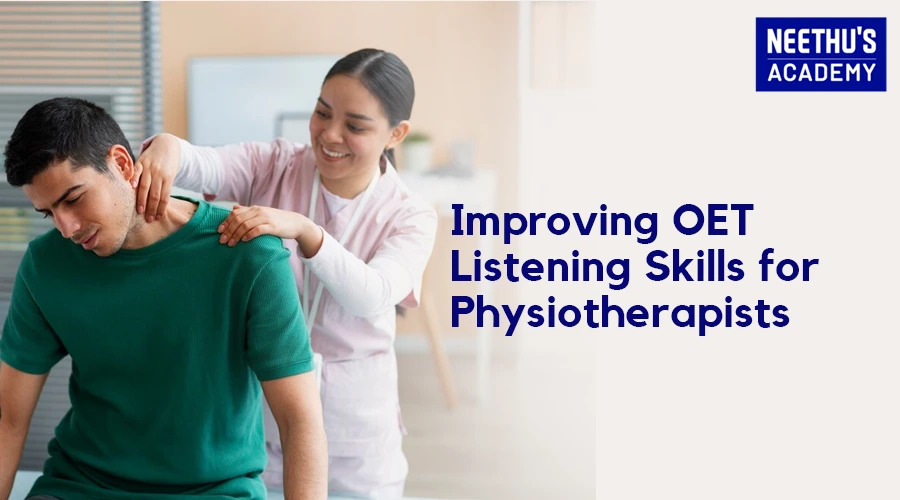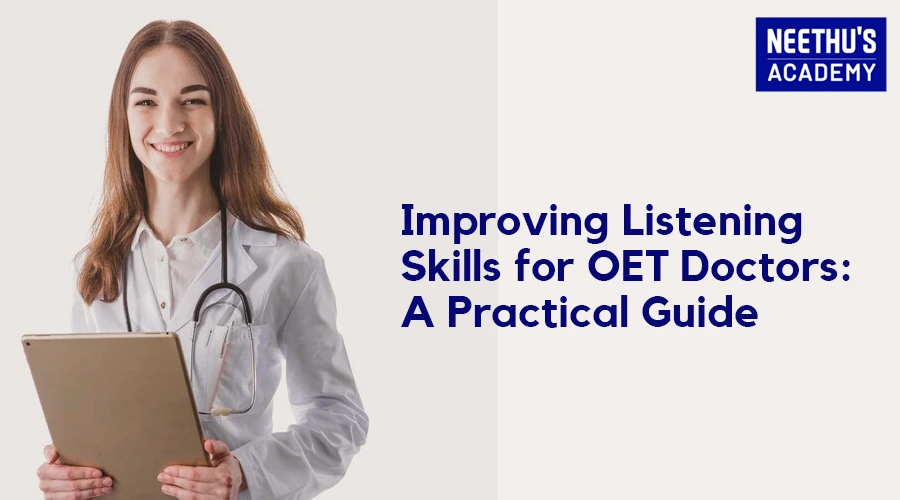OET vs IELTS for Nurses: Which Test Should You Take?
A perfect English language proficiency is strictly required for intending nurses to practice in English-speaking countries. IELTS and OET are the most commonly recommended English proficiency tests among health professionals. These tests check your linguistic ability; however, they vary in terms of their structure, weightage, and worldwide recognition. OET and IELTS are tests of language skills in English, but the two serve just slightly different objectives, which can easily be confusing for the average nurse. But knowing the differences between them will give you more odds of choosing a test that best suits your career plans, most especially if you plan on working overseas. This blog aims to provide a comparison in depth of OET and IELTS, focusing on the various advantages, especially for nurses, differences in cost, and how to prepare. This will increase your chances of getting the score you want and help you make the right decision.
Overview of OET and IELTS
OET
The Occupational English Test (OET) specifically targets nurses and other medical professionals. Since this examination evaluates skills in English usage in the clinical field, most nurses migrating to English-speaking countries like the UK, Australia, New Zealand, and Ireland prefer taking the OET.
Objective: The OET is provided for medical practitioners. It tests your ability to communicate within the clinical environment.
Skills Tested: You will be tested on speaking, writing, reading, and listening.
Test information: The content is tailored to the health industry in general; hence, this test consists of role-plays and assignments that can mimic actual events or scenarios one would have to encounter as a nurse, like patient contacts and drafting referral or discharge letters.
Since OET is widely accepted by all healthcare regulatory organizations, it puts the nurse at an advantage while applying for jobs in clinics, hospitals, or assisted living institutions.
IELTS
On the other hand, the International English Language Testing System (IELTS) is the general English proficiency test conceived and designed by academics and language teaching experts. IELTS Academic is the version commonly required for nurses, but this is not a test that focuses solely on healthcare content.
Purpose: Tests general English skills in professional or business settings as well as in academic contexts.
Skills Tested: The tested skills include speaking, writing, reading, and listening.
Test material: Topics are quite diversified, mostly not related to medicine. The test assesses your ability to use acceptable English in official life.
IELTS is recognized and accepted everywhere, both in the commercial, academic, and governmental sectors and in the health sector.
Comparison of OET and IELTS for Nurses
Exam Structure of OET
As the test pattern of OET is highly focused on healthcare scenarios, it would be easy for nurses to relate to and do well.
Listening Section: This includes audio recordings of consultations, patient conversations, and lectures.
Reading Comprehension: The reading comprehension section is divided into three parts A, B, and C. This test measures your knowledge of the text related to the health or medical field.
Writing: Based on a case study, you are asked to compose a referral, discharge, or transfer letter.
Speaking: Under this section, there will be role-plays on common nursing scenarios. As a nurse, you are going to be directly interacting with the patients and their families.
IELTS
IELTS tests your general proficiency in English; there is nothing specific to health. Because it is a test for general English proficiency, it may be somewhat challenging for nurses comparatively.
Listening: Four recordings of native speakers of English will be played for you in situations like social and academic settings through talks, interviews, and lectures.
Reading: There are three long texts from books, journals, periodicals, or newspapers not related to medicine in IELTS Academic reading.
Writing: There are two writing assignments in this section. While the second assignment will ask you to write an essay on a broad topic, the first typically asks that you describe statistics or graphs.
Speaking: The speaking test takes the form of a face-to-face interview that you will have with a professional tester and then be questioned on a variety of general topics.
Acceptance and Recognition
OET
- Accredited in New Zealand, and recognized by the Medical Council of New Zealand and Australian Health Practitioner Regulation Agency, the same standard is also endorsed by its equivalent in UK, the Nursing and Midwifery Council.
- It is very much recognized within the health industry but limited outside of the medical world.
IELTS
- It is accepted by hundreds of thousands of academic, commercial, and governmental institutions around the world.
- IELTS will give you more acceptance in more fields than just medicine. You can apply it to academic applications and for immigration, among others.
Advantages of Taking OET for Nurses
Relevance to healthcare: OET is only utilized in the health sectors, therefore it is not challenging for the nurses to effectively work in that setting.
Functional language: OET assignments are given keeping in view actual healthcare situations. For instance, composing a letter of recommendation or expressing the situation of the patient’s condition to him.
Increased comfort: Nurses can easily cope with the OET content because it essentially reflects what they are accustomed to.
Effective patient communication: The OET speaking and listening tests are centered around the discourse of the patients with the nurses, and preparing for the test enhances effective communication with patients.
Advantages of Taking IELTS for Nurses
Greater acceptance: Given that IELTS is accepted in many fields, you stand the chance of applying for jobs outside the health sector.
Different types of exams: The IELTS comes in Academic and General Training varieties, so you can choose one that fits your purpose: profession or emigration.
More career opportunities: IELTS allows access to worldwide potential academic and professional opportunities. OET, however, can only be used for career opportunities in health care.
Higher general English proficiency: IELTS improves your overall skills in the English language, which would also be helpful in cases where you will work or stay in an English-speaking country other than healthcare.
Which Test Should You Choose as a Nurse?
OET may be more apt if your ultimate goal is to work as a nurse in the healthcare facilities of other countries, particularly in the UK, Australia, or New Zealand. Since its focus on health care will better arm you to meet the language requirements of your profession, it is more appropriate for those who aim to pursue work as a nurse in healthcare facilities of other countries.
IELTS is more worthwhile if you’re interested in other job opportunities apart from nursing and if you want higher career mobility. You can probe into various career options such as academic jobs, corporate roles, and immigration routes, for it is widely recognized by a broad spectrum of industries.
Which Exam Should You Choose?
It really depends on your career, though, and the context in which you will use the skills in English. If you are in the healthcare profession, OET is likely a better option. It tests language skills in the real clinical setting, thereby gaining acceptance from the various healthcare boards. You’ll likely fast-track your licensure process and find yourself more employable through healthcare services.
If you are a student or professional from a nonmedical field, then PTE will be appropriate. PTE is a general English language proficiency test, and it is an accepted test across most industries and all kinds of educational institutions. By choosing PTE, it will also allow more flexibility for people wishing to work or study across a range of industry sectors.
Tips for Preparing for OET and IELTS
Know the kind of exam: Make sample papers or notes. Sample papers and study notes give you an idea of what OET or IELTS looks like.
Official sources: Official sources are always the best. Both tests have official study guides, webinars and practice exams
Practice tests: You might be able to edge out your time management and improve your scores by sitting for simulated exams that reflect the real examination environment.
Focus on weak areas: be it the speaking part of OET or the reading part of IELTS; focus on areas where you are not very confident about.
Join coaching institute: most of the candidates enroll in coaching initiatives because they are provided with pre-exam preparatory classes to professional guidance and individualized feedback.
Conduct practice with real tasks: Referral letter writing is a perfect exercise to be done in OET. For IELTS, practice general topics during practice.
Final thoughts
Both OET and IELTS have their pros and cons. Therefore, the final choice would quite largely depend on the career goals for nursing. If one’s goal is to work within healthcare since the test holds medicinal significance, then the obvious choice would have to be OET. However, when it comes to IELTS, it might fit you better if you look for more sizeable job opportunities or intend to submit applications in different sectors. Look ahead to your long-range goals and choose the test that best serves your career. Whichever path you take, preparation is going to be the key to cracking both of these exams.
Frequently Asked Questions





